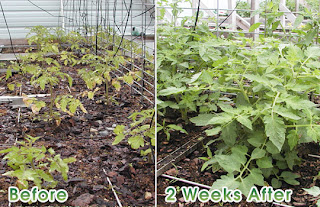Get More Benefit From Your Fertilizer
Throughout history the use of various chemicals has been an
important part of farming. Chemical
fertilizers, herbicides, pesticides, and fungicides are applied regularly on
most farms. However, more and more safety
concerns are being raised about such wide usage of chemicals in the
agricultural industry.
One source of concern is for those who consume the
produce. Most chemicals sprayed onto
fruits and vegetables are oil based so that rain won’t wash them off. However, this also means that they are more
difficult to wash off during post-harvest washing, and may find their way onto the
kitchen table.
The second concern is for the risks to farm workers who
apply them. Chemicals can enter the body
through both breathing fumes and through skin contact. Repeated exposure to toxic chemicals during
the mixing and application process can lead to health issues over time.
Thirdly, continued chemical applications can result in a
buildup of unused chemicals in the soil.
If fertilizers are not in a form that plants can easily absorb, much of the
fertilizer remains in the soil. Plants only
absorb a small percentage of the chemical fertilizers that are applied, which is
costly to farmers and damaging to the environment. The residual chemicals often leach down into
groundwater or are washed away through runoff into streams and lakes. If they reach lakes and streams, chemical
residue causes the formation of excessive algae in the water. All this algae reduces the amount of oxygen
in the water available for fish, and reduces the amount of sunlight that can
reach underwater plants. These concerns
make the efficiency of agri-chemical usage a key issue.
The impact of chemical fertilizers is reduced if plants
uptake more of the chemicals in the soil. Plant roots use electromagnetic attraction (called
Cation Exchange) to draw nutrient ions from the soil. Quantum chemistry has now been used to develop
a groundwater safe product known as BioWash Fertilizer Enhancer that increases
the Cation Exchange Capacity in plants so that a higher percentage of the fertilizer
is used by the plants. A sister product,
BioWash Soil Amendment, is applied directly to the soil and breaks down residual
fertilizers, making nutrients in the soil more easily absorbed by the plant
roots.
This increase in fertilizer efficiency not only reduces the probability
of pollution from these chemicals, the increased nutrient intake by the plants also
produces larger, healthier, plants which produce a larger crop. Because the cost of BioWash is only about
$6.00 per application per acre, the farmer can not only reduce his
environmental impact, but he can also reap higher profits from the increase in
crop production using fertilizer that would otherwise go unused and contribute to
environmental problems.

No comments:
Post a Comment